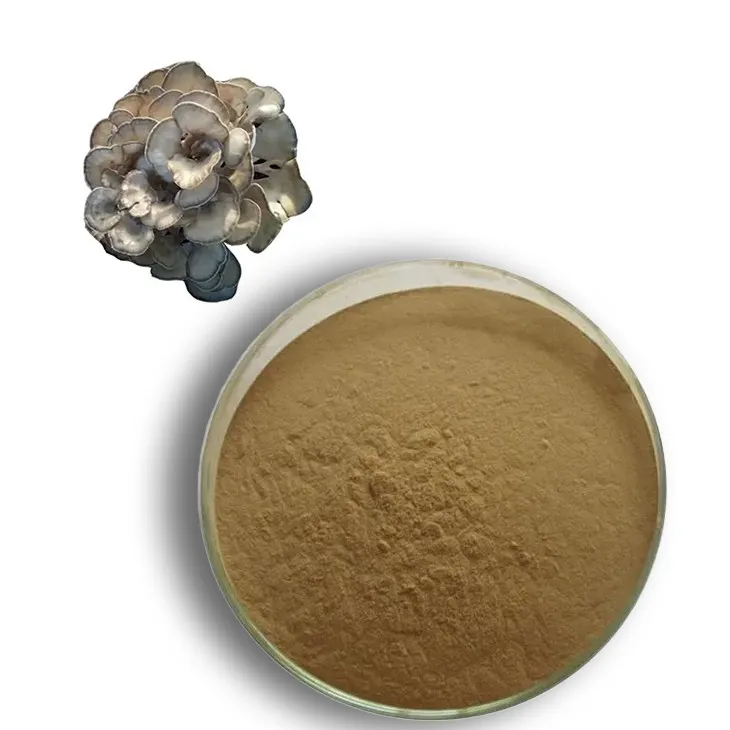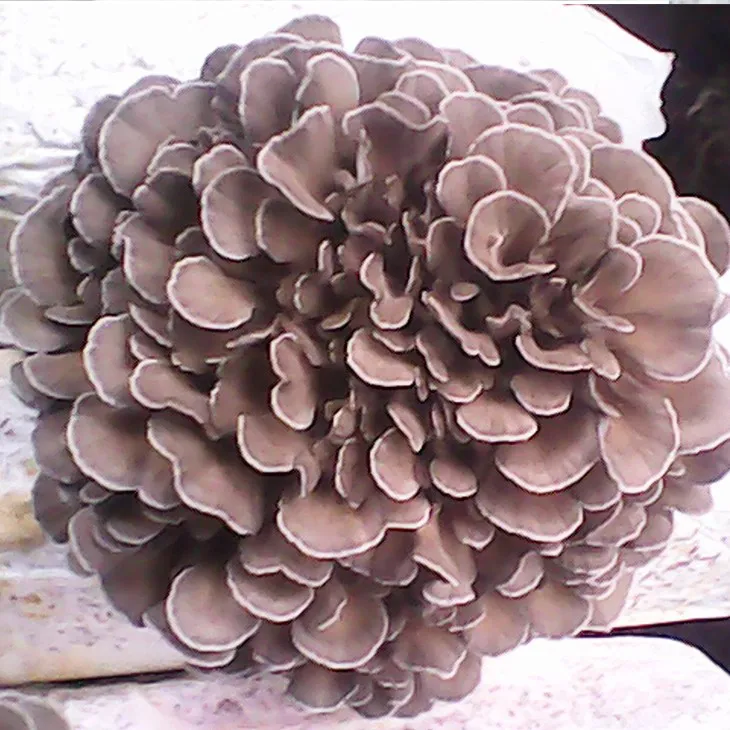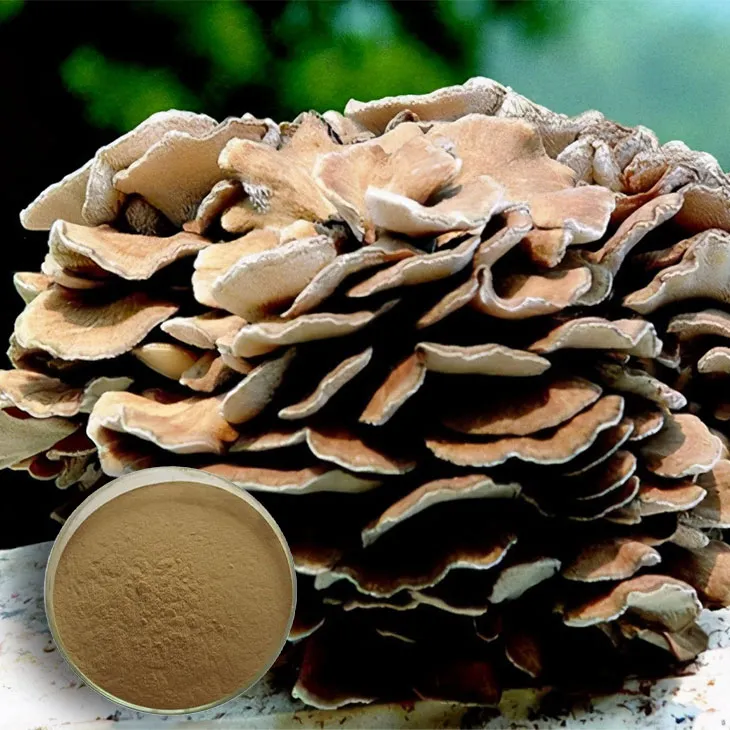- 0086-571-85302990
- sales@greenskybio.com
4 Things Consumers and Manufacturers Should Know about Maitake Mushroom Extract.
2024-12-16

1. Health Benefits for Consumers
Maitake Mushroom Extract has been associated with several potential health benefits for consumers. Immune System Support is one of the most notable aspects. The extract contains beta - glucans, which are known to stimulate the immune system. They can enhance the activity of immune cells such as macrophages and lymphocytes, helping the body to better defend against infections and diseases.
Another important benefit is its potential role in Blood Sugar Regulation. Some studies suggest that Maitake Mushroom Extract may help improve insulin sensitivity. This can be beneficial for individuals with diabetes or those at risk of developing diabetes. By improving insulin function, it may assist in maintaining stable blood sugar levels.
Maitake extract may also contribute to Cholesterol Management. It has been shown to have an impact on lipid metabolism. Specifically, it may help lower LDL (bad) cholesterol levels while maintaining or even increasing HDL (good) cholesterol levels. This can be significant for heart health, as high LDL cholesterol is a risk factor for cardiovascular diseases.
Additionally, there is some evidence indicating that Maitake Mushroom Extract may possess Anti - cancer Properties. While it is not a substitute for medical cancer treatment, certain components in the extract may have anti - tumor effects. They may help inhibit the growth and spread of cancer cells, and some research has explored its potential in combination with conventional cancer therapies.

2. Proper Dosage for Consumers
Determining the proper dosage of maitake mushroom extract is crucial for consumers. However, it can be a complex matter as it may vary depending on several factors. Age is an important consideration. For example, children may require a lower dosage compared to adults. Generally, for children, a very small amount, perhaps starting from as little as 100 - 200 mg per day, may be appropriate, but this should be under the guidance of a healthcare professional.
Health Conditions also play a role. For individuals with specific health issues such as diabetes or a weakened immune system, the dosage may need to be adjusted. For those with diabetes aiming for blood sugar regulation, a dosage in the range of 500 - 1000 mg per day may be considered, but again, medical advice is essential. In the case of using maitake extract for immune support, a typical dosage for adults could be around 300 - 500 mg per day.
It's also important to note that the form of the extract can influence the dosage. If it is in a highly concentrated form, a lower dosage may be sufficient, while a less concentrated form may require a higher amount. For example, a concentrated maitake extract powder may only need 200 - 300 mg per day, whereas a less concentrated tincture may require 500 - 1000 mg.
Consumers should always start with a low dosage and gradually increase it while monitoring their body's response. This helps to avoid any potential adverse reactions and allows the body to adjust to the supplement.

3. Possible Side Effects for Consumers
While maitake mushroom extract is generally considered safe for most people, there are some possible side effects that consumers should be aware of. Gastrointestinal Disturbances are among the most common. Some individuals may experience mild stomach upset, including symptoms such as nausea, bloating, or diarrhea. This is more likely to occur when starting a new supplement or if the dosage is too high.
In rare cases, there may be Allergic Reactions. People with known mushroom allergies are at a higher risk. Allergic reactions can range from mild symptoms such as skin rashes and itching to more severe reactions like difficulty breathing and swelling of the face, lips, or tongue. If any signs of an allergic reaction occur, consumers should stop taking the extract immediately and seek medical attention.
Another potential side effect is Interactions with Medications. Maitake mushroom extract may interact with certain medications. For example, it may enhance the effects of blood - thinning medications, increasing the risk of bleeding. It's crucial for consumers who are taking medications, especially those for blood - related conditions, diabetes, or immune - suppressing drugs, to consult their doctor before starting maitake extract supplementation.

4. Key Considerations for Manufacturers
4.1. Extraction Methods
Manufacturers need to pay close attention to extraction methods when producing maitake mushroom extract. Solvent - based Extraction is one common method. However, the choice of solvent is critical. Ethanol is often used, but it must be of high purity to ensure that no harmful residues are left in the extract. Using impure solvents can lead to contamination and potential health risks for consumers.
Water - based Extraction is another option. This method is generally considered more natural and may be preferred by some consumers. However, it can be less efficient in extracting certain active components compared to solvent - based methods. Manufacturers need to optimize the water - based extraction process to ensure a sufficient yield of beneficial compounds.
Additionally, new and innovative extraction techniques are emerging. For example, Supercritical Fluid Extraction using carbon dioxide. This method can offer advantages such as higher selectivity and the ability to operate at lower temperatures, which helps preserve the integrity of the active compounds in the maitake mushroom. However, it requires specialized equipment and expertise, which can be a significant investment for manufacturers.
4.2. Quality Control
Quality control is essential for manufacturers of maitake mushroom extract. Raw Material Selection is the first step. Only high - quality maitake mushrooms should be used. This means mushrooms that are grown in a clean and controlled environment, free from contaminants such as pesticides and heavy metals. Manufacturers should have strict sourcing criteria and conduct regular inspections of their suppliers.
Testing for Purity and Potency is also crucial. The extract should be tested for the presence of impurities, including residual solvents, pesticides, and heavy metals. At the same time, the potency of the active components, such as beta - glucans, should be measured accurately. This ensures that the product meets the expected quality standards and provides the claimed health benefits.
Good Manufacturing Practice (GMP) compliance is a must. Manufacturers should follow strict GMP guidelines, which cover aspects such as facility cleanliness, equipment maintenance, and proper documentation. This helps to ensure the consistency and safety of the production process.
4.3. Compliance
Manufacturers need to be compliant with various regulations. Food and Drug Regulations are of utmost importance. Depending on the country or region, there may be specific requirements for labeling, claims, and safety standards for maitake mushroom extract products. For example, in the United States, dietary supplements are regulated by the FDA, and manufacturers must ensure that their products meet the relevant regulations.
Export and Import Regulations also come into play. If manufacturers plan to export their maitake mushroom extract products, they need to be aware of the regulations in the destination countries. This may include requirements for product registration, quality certification, and packaging specifications. Similarly, for importing raw materials or equipment related to maitake extract production, compliance with import regulations is necessary.
FAQ:
What are the potential health benefits of Maitake Mushroom Extract for consumers?
Maitake Mushroom Extract may have several potential health benefits. It is often associated with immune system support, as it may contain compounds that can enhance the body's natural defenses. Some studies suggest it might also have anti - diabetic properties, potentially helping with blood sugar regulation. Additionally, it could have anti - cancer properties, although more research is needed in this area. It may also contribute to heart health by helping to manage cholesterol levels.
How can consumers determine the proper dosage of Maitake Mushroom Extract?
The proper dosage of Maitake Mushroom Extract can vary depending on factors such as a person's age, health condition, and the intended use. In general, it is advisable to follow the instructions on the product label. However, it is also a good idea to consult a healthcare professional, especially if you have pre - existing health conditions or are taking other medications. They can provide personalized advice based on your individual situation.
What are the possible side effects of Maitake Mushroom Extract for consumers?
While Maitake Mushroom Extract is generally considered safe for most people, some possible side effects may occur. In some cases, it may cause digestive issues such as diarrhea, nausea, or stomach upset. Allergic reactions are also possible, especially in individuals who are allergic to mushrooms. If any unusual symptoms occur after taking Maitake Mushroom Extract, it is important to stop use and consult a doctor.
What are the important aspects of extraction methods for manufacturers?
For manufacturers, the extraction method is crucial. Different extraction methods can affect the quality and potency of the Maitake Mushroom Extract. Solvent - based extraction methods need to ensure the safety of the solvents used and proper removal to avoid residue in the final product. Non - solvent extraction methods, such as supercritical fluid extraction, may offer a more natural" alternative but may also be more complex and costly. The extraction process should aim to preserve the bioactive compounds present in the maitake mushroom.
How can manufacturers ensure quality control in Maitake Mushroom Extract production?
Manufacturers can ensure quality control in several ways. Firstly, they should source high - quality maitake mushrooms from reliable suppliers. During the extraction process, strict monitoring of parameters such as temperature, pressure, and extraction time is necessary. After extraction, the product should be tested for purity, potency, and the presence of contaminants. Quality control also involves proper packaging to protect the extract from degradation and contamination, and regular batch - to - batch testing to ensure consistency.
What does compliance mean for manufacturers of Maitake Mushroom Extract?
Compliance for manufacturers of Maitake Mushroom Extract involves following all relevant regulations and standards. This includes food safety regulations, which govern aspects such as labeling, purity, and safety of the product. Manufacturers may need to comply with regulations regarding the use of certain extraction methods and additives. They also need to ensure that any health claims made about the product are supported by scientific evidence and are in line with regulatory requirements.
Related literature
- "The Health Benefits of Maitake Mushroom: A Review"
- "Maitake Mushroom Extract: Production, Quality Control, and Potential Applications"
- "Safety and Efficacy of Maitake Mushroom in Health and Disease"
- ▶ Hesperidin
- ▶ citrus bioflavonoids
- ▶ plant extract
- ▶ lycopene
- ▶ Diosmin
- ▶ Grape seed extract
- ▶ Sea buckthorn Juice Powder
- ▶ Beetroot powder
- ▶ Hops Extract
- ▶ Artichoke Extract
- ▶ Reishi mushroom extract
- ▶ Astaxanthin
- ▶ Green Tea Extract
- ▶ Curcumin Extract
- ▶ Horse Chestnut Extract
- ▶ Other Problems
- ▶ Boswellia Serrata Extract
- ▶ Resveratrol Extract
- ▶ Marigold Extract
- ▶ Grape Leaf Extract
- ▶ blog3
- ▶ blog4
- ▶ blog5
-
Pure 85% Tomentil Extract.
2024-12-16
-
Almond Extract Powder
2024-12-16
-
Lycopene
2024-12-16
-
Avocado Extract Powder
2024-12-16
-
Scutellaria Extract
2024-12-16
-
Echinacea Extract
2024-12-16
-
Curcuma Longa Extract/Turmeric extract
2024-12-16
-
Citrus Aurantium Extract
2024-12-16
-
Hedyotis Diffusa Extract
2024-12-16
-
White mustard seed extract
2024-12-16
-
Kidney Bean Extract
2024-12-16





















